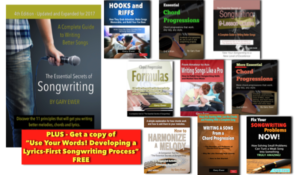There are things a songwriter should remember because they’ll result in better songs. There are other things that will result in a happier you. From time to time, you need to sit back and bring those things to mind.
I write music almost every day. Sometimes they’re arrangements of already-existing songs (folk songs, for example). Sometimes they’re original works for choirs or other vocal groups. Sometimes they’re short snippets — exercises, in a way — that will work their way into something I’m writing or going to write.
 If you think it’s time to put the magnifying glass on your songwriting technique, get the 10-eBook Bundle that thousands of songwriters are using. $37 USD, immediate download, along with a FREE copy of “Use Your Words! Developing a Lyrics-First Songwriting Process.”
If you think it’s time to put the magnifying glass on your songwriting technique, get the 10-eBook Bundle that thousands of songwriters are using. $37 USD, immediate download, along with a FREE copy of “Use Your Words! Developing a Lyrics-First Songwriting Process.”
It doesn’t matter what I’m writing, the following 10 things serve as my own personal reminders about how to make my music work, and how to stay happy doing it:
1. The power and importance of contrast.
Every time I come up with a musical idea that I like, I think two things: “Great, what does it sound like when I repeat it?” (See next point) and 2) What do I contrast that with?” If it’s a minor key idea, I usually set to work coming up with a major key one. If it’s loud, I try to create something that works as a gentle “answer.” Sometimes contrast has to be more subtle than that, but contrast in music is one important part of what keeps people listening.
2. Repetition is a good thing in songwriting.
It’s impossible to find a song that doesn’t use repetition. In music, once we hear something, we want to hear some aspect of it repeating: the melody itself, the chords, the rhythms, perhaps the lyric. Repetition is one of the most important components of song form, and it’s usually vital.
3. Simplicity is more important than complexity.
I love complexity in music, but not at the expense of the understanding of the listener. It’s fine (and sometimes fun) to have complexity mean that the listener won’t understand every aspect of my music right away. But simplicity, at least on some level, means that the music can make a connection to the audience. And remember that simplicity with one element of music (the rhythmic groove, let’s say) can allow you to go for a more complex lyric or melody. Balancing complexity and simplicity can result in wonderful music.
4. Songs are about feelings.
That’s why it’s so hard to write a song about the quadratic equation or your car’s brake shoes. But that doesn’t mean you simply get to write about how you’re feeling. It’s more that you’re writing about something which can generate an emotional response from your listeners. That’s how you make that all-important emotional connection. Writing about your feelings with no back-story just sounds empty, with nothing for an audience to connect to.
5. There is no such thing as a killer chord progression.
Or maybe the best way to say it is that all progressions are killer, if they support the melody (in a direct sort of way) and the lyric (in an indirect sort of way.)
6. Every song should be a reflection of some aspect of who you are.
Songwriting takes confidence and it takes courage. The way you craft your melodies, write your lyrics, and put it all together needs to be a unique display of what is essentially YOU.
7. Every song is a partnership of song elements.
Your song may have an amazing lyric, but if it sounds best with a static, less-than-contoured melody, that melody is performing a very important function: staying out of the way. There are no songs where weakness or flaws are acceptable. The partnership of elements is always present and always important.
8. Being comfortable with as many songwriting processes as possible is crucial to good writing.
If you love the chords-first process, it’s time to focus on melodies and lyrics. If you always start your song with a poem you’ve written, try leaving words to the final step. Why? Having several different processes is one of the best ways to combat writer’s block. If you develop a creative block using one method, you’ve got another method ready to try.
9. No one ever became famous by simply being good.
Think about this: Every studio guitarist I know is fantastic, but no one knows their names unless you look them up in the liner notes. Being fantastic will get you jobs, not fame. Fame comes from being *uniquely* good, with the emphasis on being unique. Bob Dylan’s fame as a singer and a songwriter comes from being unique in both fields. If you want fame as a songwriter, you need to be good, but you need to be also doing things that no one else is doing.
10. Consistency is everything in songwriting.
Writing one great song only shows potential. You need to be writing great music with consistency. Bad golfers can hit a hole in one. That kind of success can be a fluke. Consistency comes from writing daily, listening daily, and learning from other great songs out there.
 Written by Gary Ewer. Follow Gary on Twitter.
Written by Gary Ewer. Follow Gary on Twitter.
 For songs in the pop genres, a good chorus hook can mean the difference between success and failure. “Hooks and Riffs: How They Grab Attention, Make Songs Memorable, and Build Your Fan Base” will show how this vital song component works, and how you can create effective ones for your songs.
For songs in the pop genres, a good chorus hook can mean the difference between success and failure. “Hooks and Riffs: How They Grab Attention, Make Songs Memorable, and Build Your Fan Base” will show how this vital song component works, and how you can create effective ones for your songs.











I really enjoyed reading your article. I am a songwriter, producer, and performer. My name is Linval Thomas. My moniker is Ashaka. And I will incorporate the 10 recommendations you suggested into my forthcoming song, “Kontrol Your Destiny.” I am hearing a reggae hub in my head, as I am writing, contrasted with humanity, empowerment, title repetition, spirituality, and more in its lyrical and melodic content. “Kontrol Your Destiny” premiers November 2021 on my website and will be available for streaming and downloading everywhere you listen to music. So stay tuned.
Love music a life, it always on my head in every single day of my life. But i had been running from it then and now. But deep in me, i know music is part of me. U enjoys singing But the biggest problem is, my voice. Secondly can’t seems to found d key of forming/putting my composeing songs together to my own satisfaction even when others seems to be ok with.
Pls help me with some tips
i write lyrics but it makes sense the first time then the second time it doesn’t make any since and im not so sure what to do about it . it goes great with the beat but the words pulls me off alot.
-tete
Hi Tete – Sometimes getting a lyric to sound right involves a lot of reworking. If it sounds good to start with, and then starts to sound less impressive the more you hear it, you need to try to pinpoint where it starts to sound weak. Ask yourself:
– Is the problem with the rhythm of the words? Does the rhythm of the music match up with the rhythm of the words?
– Is the problem with what you’re writing about. Is it a good topic, one that will interest others?
– Is the problem with your choice of words? Are you using the kinds of words you’d hear in a typical conversation?
There are other things to consider with song lyrics. A few years back I wrote an article called “5 Cures For the Lame Lyric“, and I hope you might find that useful.
-Gary
We are all different when it comes to a session, for instance I write my best
songs whilst doing something else , like Sleeping -Do It Yourself and Cycle Touring
in fact its my Sub Concious , perhaps many do the same ??? Stuck for a musical
phrase or a matching lyric I pack up and walk away to my car or my house often to
return to my garden studio and jot something down for the next session, or re record a line
Agree with every point here. I’d be curious to know what your songwriting sessions look like. Thanks for the reminders!
Hi Caleb:
My songwriting sessions (like most people’s, I suppose) vary depending on which part of the process I’m in. If I’m starting something new, it involves a lot of improvising ideas at my keyboard. I work using the Finale scoring software, so my keyboard is connected to my computer for that purpose. I usually start everything by having a file open in Finale, and I sketch out ideas in a document.
Before long, I’ve usually got an idea of where I’m going with my new piece, so I open a new document that allows me to start putting it all together. So at that point, I’ve typically got two documents on the go: one with sketches and ideas, and a second one as a “final” document.
I don’t often write lyrics (esp. if I’m doing a musical arrangement of a pre-existing folk song, let’s say), but when I do, I work the same way in a word processor: one document with word lists, and a second document where I put a more completed lyric together.
-Gary